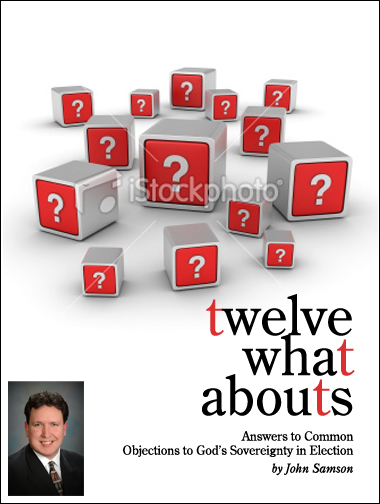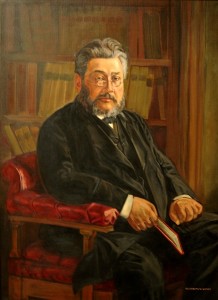I would very much appreciate your prayers. I am in the final stages of writing a book which, God willing, will be published in an e-book format. I hope to be finished by the end of the month.
Here’s the first working cover art work (thanks J):


 Dr. Michael Horton responds to this highly emotional question (from an article found suffering, sin, and even the fall of humanity itself. In his recent book, Against Calvinism, Roger Olson carefully distinguishes the official teaching of Calvinism from where he thinks it logically leads. However, there are over three dozen statements in his book about Calvinism leading by good and necessary logic to a deity who is a “moral monster,” indistinguishable from the devil.
Dr. Michael Horton responds to this highly emotional question (from an article found suffering, sin, and even the fall of humanity itself. In his recent book, Against Calvinism, Roger Olson carefully distinguishes the official teaching of Calvinism from where he thinks it logically leads. However, there are over three dozen statements in his book about Calvinism leading by good and necessary logic to a deity who is a “moral monster,” indistinguishable from the devil.
I respond to this charge directly in my companion volume, For Calvinism. A thoughtful review of my book from an Arminian perspective came to my attention today and this question again rose to the surface. (By the way, Calvinists talk so much about predestination more because of the charges leveled repeatedly against it than because of its alleged centrality.)
If God knew that Adam and Eve were going to transgress his law, why didn’t he change the circumstances so that they would have made a different choice?
Why would God create people he knew would be condemned for their original and actual sin?
The questions multiply.
Taking on this question in a blog post is a little dangerous. For a statement of the Reformed position and its scriptural basis, I’d refer readers to For Calvinism.
However, there is one point that is worth pondering briefly: Non-Calvinist theologies are just as vulnerable on this question. Classic Arminian theology shares with Calvinism—indeed with all historic branches of Christianity—that God’s foreknowledge comprehends all future events. There is nothing that happens, nothing that you and I do, that lies outside of God’s eternal foreknowledge.
Now go back and read those questions above. Notice that they don’t refer to predestination, but to mere foreknowledge. They pose a vexing challenge not merely to Calvinists but to anyone who believes that God knows exhaustively and eternally everything that will happen. In other words, everyone who affirms God’s exhaustive foreknowledge has exactly the same problem as any Calvinist. If God knows that Adam will sin—or that you and I will sin—and could keep it from happening, but does not, and God’s knowledge is infallible, then it is just as certain as if he had predestined it. In fact, it is the same as being predestined. Then the only difference is whether it is determined without purpose or with purpose.
Roger Olson states his own view: “God is sovereign in the sense that nothing at all can ever happen that God does not allow” (100). So, if the fall happened, then God allowed it. The fall “was not a part of [God’s] will except to reluctantly allow it” (99). OK, but then the fall was in some sense a part of God’s will. Calvinists acknowledge that it was not part of God’s revealed (or moral) will, but that he willingly permitted it as part of his plan. Yet Roger is looking for something in between: God “permits” it, but it is not a “willing permission” (64). Aside from the fact that any act of God in permitting something is already an act of will—a choice, my main point here is that Roger’s weaker claim is still strong enough to get him into the same hot water with the rest of us. Roger agrees that God knows everything that will happen. God even supervises everything that will happen. Nothing escapes his oversight. “I believe, as the Bible teaches and all Christians should believe, that nothing at all can happen without God’s permission” (71).
And yet, Roger rejects R. C. Sproul’s statement, “What God permits, he decrees to permit” (78). Now, what could be more obvious than the fact that when someone with the authority to do otherwise permits something contrary to his revealed will, he is deciding, choosing, decreeing to allow it? Here again, Roger’s notion of a presumably unwilling permission is an oxymoron. To permit something is to make a positive determination, even if it in no way makes the one permitting it responsible for the action. So what is the substantive difference between saying, with Roger, that “nothing at all can ever happen that God does not allow,” and with R. C. Sproul, “What God permits, he decrees to permit”?
There is indeed a trail of hyper-Calvinism on the fringes of Augustinian Christianity that turns God’s decree to permit into a decree to accomplish or bring about. There, then: God is the author of sin. Next question? That certainly solves the intellectual riddle. Or, one can untie the knot in the other direction. Some have moved beyond Arminianism into the Socinian view that God doesn’t even know the future actions of free moral agents. Known as “open theism,” this denial of God’s omniscience recognizes that Arminianism and Calvinism are unable to resolve this dilemma. They rightly see that if God foreknows everything from eternity, including our free acts, then these acts are certain to come to pass. Foreknowledge entails predestination, so they reject the classical Christian doctrine of God’s omniscience.
Hyper-Calvinists and hyper-Arminians share the same impatience with mystery. Neither position bows reverently before God’s revelation, acknowledging its clear affirmations of divine sovereignty and human responsibility without answering all of our philosophical questions. Contradictions are abhorrent to the faith, but every important docrine in Scripture is shrouded in mystery. Hyper-Calvinism and hyper-Arminianism are willing even to set Scripture against Scripture, rejecting some clear teachings in favor of others, for the sake of rational satisfaction. Yet both, in different ways, represent deadly errors—indeed, blasphemies—against the character of God.
Happily, the debate between Roger and me is not hyper-Calvinism vs. hyper-Arminianism. The real difference between Calvinism and Arminianism is whether God has a purpose when he allows sin and suffering. Again, both views affirm that nothing happens apart from God’s permission. However, Calvinism teaches that God never allows any evil that he has not already determined to work together for our good (Rom 8:28). Nothing that he allows can terminate in evil. What would we say of a deity who “reluctantly permitted” a terrible disaster or moral tragedy, without a determination to overcome that evil with good? But that takes a plan and that plan must necessarily comprehend the evil that he is to conquer.
Any view that makes God the author of sin does indeed turn the object of our worship into a moral monster. However, any deity who merely stands around reluctantly permitting horrible things for which he has no greater purpose in view, is equally reprehensible. In the one, God is sovereign but not good; in the latter, God is neither. Once you acknowledge that God foreknows a sinful act and chooses to allow it (however reluctantly) when he could have chosen not to, the only consolation is that God never would have allowed it unless he had already determined why he would permit it and how he has decided to overcome it for his glory and our good. Mercifully, Scripture does reveal that God does exactly that. Roger agrees that God “chose to allow” suffering and sin (72). The Calvinist says that God chose to allow them for a reason. It’s permitting rather than creating, but it’s permission with a purpose. Permission without purpose makes God a “moral monster” indeed.
Reformed theology has maintained consistently that Scripture teaches God’s exhaustive sovereignty and human responsibility. God does not cause evil. In fact, God does not force anyone to do anything against his or her will. And yet, nothing lies outside of the wise, loving, good, and just plan “of him who works all things after the council of his own will” (Eph 1:11). That God’s sovereignty and human responsibility are true, no serious student of Scripture can deny. How they can be true is beyond our capacity to understand. As Calvin put the matter, following Luther, any attempt to unravel the mystery of predestination and human responsibilty beyond Scripture is a “seeking outside the way.” “Better to limp along this path,” says Calvin, “than to rush with all speed outside of it.”
 “Someone asked Martin Luther what we contribute to salvation, ‘Sin and resistance.’” – Michael Horton
“Someone asked Martin Luther what we contribute to salvation, ‘Sin and resistance.’” – Michael Horton
“The elect are gathered into Christ’s flock by a call not immediately at birth, and not all at the same time, but according as it pleases God to dispense his grace to them. But before they are gathered unto that supreme Shepherd, they wander scattered in the wilderness common to all; and they do not differ at all from others except that they are protected by God’s especial mercy from rushing headlong into the final ruin of death. If you look upon them, you will see Adam’s offspring, who savor of the common corruption of the mass. The fact that they are not carried to utter and even desperate impiety is not due to any innate goodness of theirs but because the eye of God watches over their safety and his hand is outstretched to them!” – John Calvin
“At the moment the Roman Catholic Church condemned the biblical doctrine of justification by faith alone, she denied the gospel and ceased to be a legitimate church, regardless of all the rest of her affirmations of Christian orthodoxy. To embrace her as an authentic church while she continues to repudiate the biblical doctrine of salvation is a fatal attribution.” – R. C. Sproul
“The one thing needed above all else is the accompanying power of the Spirit… It is the power from on high. It is the preacher gliding on eagles wings, soaring high, swooping lie, carrying and being carried along by a dynamic other than his own. His consciousness of what is happening us not obliterated. He is not in a trance. He is being worked on but is aware that he is still working. He is being spoken through but knows he is still speaking.” – Dr. Martyn Lloyd-Jones, The Sacred Anointing pg 28-29
God’s love is unconditional toward those he intends to adopt as his children. He does not make us meet a condition (faith) before he will love us. He meets all conditions for us in Christ by doing for us what we are unable to do for ourselves, that is, giving us everything we need for salvation, including a new heart to believe. (Ezek 36:26).
“Nothing is so calming and comforting to the Christian pilgrim, as the assurance of Divine Guidance in every, even the most minute circumstances which befall him. Without this perception of his heavenly Father’s care, a thousand intricacies must beset his path. He must be staggered at almost every step. But when he beholds, by faith—the unerring hand of infinite wisdom, wielding the stupendous machine of human events—causing everything to promote the spiritual good of His people—then he quiets himself as a little child, and can say with cheerful resignation, “Father, not my will, but yours be done.” – Thomas Reade
“There are two ways to get enough. One is to continue to accumulate more and more. The other is to desire less.” – G.K. Chesterton
“Prayer is nothing but the breathing that out before the Lord, that was first breathed into us by the Spirit of the Lord.” – Thomas Brooks
“The Christian thinks any good he does comes from the Christ-life inside him. He does not think God will love us because we are good, but that God will make us good because he loves us; just as the roof of a greenhouse does not attract the sun because it is bright, but becomes bright because the sun shines on it.” – C. S. Lewis, Mere Christianity, Book 2, chapter 5
“God’s chief gift to those who seek Him is Himself.” – E.B. Pusey
“The testimony of the Spirit is superior to reason. For as God alone can properly bear witness to his own words, so these words will not obtain full credit in the hearts of men, until they are sealed by the inward testimony of the Spirit. The same Spirit, therefore, who spoke by the mouth of the prophets, must penetrate our hearts, in order to convince us that they faithfully delivered the message with which they were divinely entrusted.” – John Calvin
“How soon marriage counselling sessions would end if husbands and wives were competing in thoughtful self-denial.” – Walter Chantry
Some Spurgeon Quotes:
 “”Oh!” saith the Arminian, “men may be saved if they will.” We reply, “My dear sir, we all believe that; but it is just the ‘if they will’ that is the difficulty. We assert that no man will come to Christ unless he be drawn; nay, we do not assert it, but Christ himself declares it—’Ye will not come unto me that ye might have life;’ and as long as that ‘ye will not come’ stands on record in Holy Scripture, we shall not be brought to believe in any doctrine of the freedom of the human will.” It is strange how people, when talking about free-will, talk of things which they do not at all understand. “Now,” says one, “I believe men can be saved if they will.” My dear sir, that is not the question at all. The question is, are men ever found naturally willing to submit to the humbling terms of the gospel of Christ? We declare, upon Scriptural authority, that the human will is so desperately set on mischief, so depraved, and so inclined to everything that is evil, and so disinclined to everything that is good, that without the powerful, supernatural, irresistible influence of the Holy Spirit, no human will ever be constrained towards Christ.” – Charles H. Spurgeon – from sermon entitled “Human Inability”
“”Oh!” saith the Arminian, “men may be saved if they will.” We reply, “My dear sir, we all believe that; but it is just the ‘if they will’ that is the difficulty. We assert that no man will come to Christ unless he be drawn; nay, we do not assert it, but Christ himself declares it—’Ye will not come unto me that ye might have life;’ and as long as that ‘ye will not come’ stands on record in Holy Scripture, we shall not be brought to believe in any doctrine of the freedom of the human will.” It is strange how people, when talking about free-will, talk of things which they do not at all understand. “Now,” says one, “I believe men can be saved if they will.” My dear sir, that is not the question at all. The question is, are men ever found naturally willing to submit to the humbling terms of the gospel of Christ? We declare, upon Scriptural authority, that the human will is so desperately set on mischief, so depraved, and so inclined to everything that is evil, and so disinclined to everything that is good, that without the powerful, supernatural, irresistible influence of the Holy Spirit, no human will ever be constrained towards Christ.” – Charles H. Spurgeon – from sermon entitled “Human Inability”
“I question whether we have preached the whole counsel of God, unless predestination with all its solemnity and sureness be continually declared.” (Charles Spurgeon, Sermons, Vol. 6, p. 26).
“One thing more, and it is this. Let us, dear brethren, try to get saturated with the gospel. I always find that I can preach best when I can manage to lie a-soak in my text. I like to get a text, and find out its meaning and bearings, and so on; and then, after I have bathed in it, I delight to lie down in it, and let it soak into me. It softens me, or hardens me, or does wh…atever it ought to do to me, and then I can talk about it. You need not be very particular about the words and phrases if the spirit of the text has filled you; thoughts will leap out, and find raiment for themselves. Become saturated with spices, and you will smell of them; a sweet perfume will distill from you, and spread itself in every direction; — we call it unction. Do you not love to listen to a brother who abides in fellowship with the Lord Jesu s? Even a few minutes with such a man is refreshing, for, like his Master, his paths drop fatness. Dwell in the truth, and let the truth dwell in you. Be baptized into its spirit and influence, that you may impart thereof to others. If you do not believe the gospel, do not preach it, for you lack an essential qualification; but even if you do believe it, do not preach it until you have taken it up into yourself as the wick takes up the oil. So only can you be a burning and a shining light.” – C. H. Spurgeon
“It is no novelty, then, that I am preaching; no new doctrine. I love to proclaim these strong old doctrines that are called by nickname Calvinism, but which are truly and verily the revealed truth of God as it is in Christ Jesus. By this truth I make my pilgrimage into the past, and as I go, I see father after father, confessor after confessor, martyr after martyr, standing up to shake hands with me… Taking these things to be the standard of my faith, I see the land of the ancients peopled with my brethren; I behold multitudes who confess the same as I do, and acknowledge that this is the religion of God’s own church.” (Spurgeon’s Sovereign Grace Sermons, Still Waters Revival Books, p. 170).
“Our estimate of Christ is the best gauge of our spiritual condition; as the thermometer rises in proportion to the increased warmth of the air, so does our estimate of Jesus rise as our spiritual life increases in vigor and fervency.” – C. H. Spurgeon